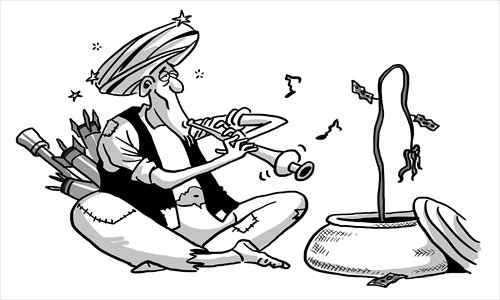India’s soft spot economy, not military

Fifty years have passed since the Sino-Indian Border War of 1962. Many young Chinese only have a vague idea of that war, but the Indians haven't forgotten.
The Times of India recently published a series of articles on the 1962 conflict. One of the articles, "50 years on, China is an opportunity as well as a challenge," published on October 10, criticized Indians who "never looked at ourselves critically on that war. And, perhaps, left gaps in future strategic thought."
According to the article, India remains mired in the unspoken thought that "the war stopped when China carried out a unilateral cease-fire," and the greatest challenge of India is how it "learns to live with China."
Such thoughts are still haunting Indians after five decades. Some Indians still worry that sometime in the future, China, with increasing military power, may retake the land that it recovered but later gave to India five decades ago.
As the article points out, "As a society, India doesn't invest in Chinese thought, language or culture and continue to train our attentions to Pakistan or the US. You would be hard-pressed to find Chinese scholars in India."
As a result, some Indians do not believe China will sincerely sit down at the negotiation table and engage in peaceful talks with India so as to completely solve the problems of boundary demarcation. More importantly, India cannot understand where China's strength lies today, and thus fails to find a way through which it can really deal with China's influence or seek joint development.
In the past 50 years, China has witnessed great changes in its military power. The PLA's arms and equipment are apparently better than those of the Indian army, and China has increased its spending on border defense. But China's military growth is essentially simultaneous with its economic development.
The Sino-Indian gap actually lies in the economy. China's power stems from its reform and opening-up. Today China has become the second largest economy in the world.
What deserves more attention from India is the spillover effect of the Chinese economy, rather than the comparison of military power between the two countries. Due to the insistently deepening cooperation between China and ASEAN, this region has a bright economic future ahead.
Compared with military growth, the influence of economic development takes place in a much more indirect and implicit way. However, the latter probably has greater influence, as promoting economic growth is key to winning public support.
East of India, changes are taking place. As soon as the vigor of Myanmar, which has embarked on the path of reform, is activated, the economic fever brought by prosperous development throughout East Asia will spread all the way to India's border.
The Stillwell Road through Southeast Asia, once used to transport supplies to the Chinese from the Allies from 1942 to 1945, will have a greater effect than it did in World War II.
As more and more ordinary Indians, especially those living in bordering regions of northeastern India, feel the benefits of rapid economic growth in China and East Asia, how will they look at New Delhi? This is probably the question that India needs to give the most consideration.
Fundamentally, artillery and rockets are used to keep the public happy, which China has long recognized. In the 21st century, it is social development and better civil livelihood that best help collect public support.
India has greater military strength in its northeastern regions than before. However, the Assam state remains in chaos, and a recent flood left 1.7 million people homeless. Development has remained stagnant in this region for years. The poor economy will only worsen ethnic conflict.
India's soft spot is economic, not military. India has no better choice than to quickly boost its economic growth and improve people's lives in its northeastern regions.
India's military strength may help defend its border with China. But China's influence, no matter how indirect it looks at the moment, cannot be avoided. Instead, it's pressing on India right now.
The author is a senior editor with the People's Daily. He's now stationed in Bangkok. dinggang@globaltimes.com.cn